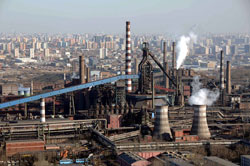2007年11月19日 欧佩克担忧美元贬值
|
石油输出国组织(OPEC,简称欧佩克)将进一步研究美元不断贬值对其经济体的影响。此前,有成员国呼吁欧佩克以美元以外的货币为石油定价。 Opec is to study further the effect of the falling US dollar on its economies following calls for it to price oil in currencies other than the greenback.
The move, which emerged at the summit of cartel leaders in Riyadh, was an attempt to bridge the divide within the group over how to respond to the dollar’s decline. Iran and Venezuela had pushed for Opec to move away from the dollar in the face of strong opposition from the summit’s host, Saudi Arabia.
Mahmoud Ahmadi-Nejad, Iran’s president, said after the leaders’ meeting that the falling dollar meant oil producers were subsidising the US government and people.
“They get our oil and give us a worthless piece of paper,” he said. “We all know that the US dollar has no economic value.”
The dollar has dropped 16 per cent this year against a basket of major currencies, and 44 per cent against the euro since the last Opec summit in Caracas, Venezuela, in 2000. Iranian officials have said that the average price of a barrel of their oil so far this year is, at $63, only $2 higher than for the same period of 2006. Priced in euros, oil has been cheaper this year than last year.
Finance and foreign ministers from Opec countries are to meet in Abu Dhabi in the next few weeks to discuss the effect of the dollar, a move hinted at in an oblique reference in the summit’s closing declaration.
On Friday, Prince Saud Al-Faisal, Saudi Arabia’s foreign minister, warned that the dollar could “collapse” if the US currency was mentioned in the declaration.
His remarks – made in what was supposed to be a closed ministerial meeting – were accidentally broadcast to reporters.
After the summit, Prince Saud played down the significance of the ministers’ further examination of the dollar problem, saying it did not have any “hidden implications” and reflected Opec members’ duty ”to maximise the return from their resources”. |


![商务细节之个人创业[英语漫画]](/uploads/hangye/2023/12/07/08190218550.gif)
![商务细节之玩转公关公司[英语漫画]](/uploads/hangye/2023/12/07/08190335360.gif)




